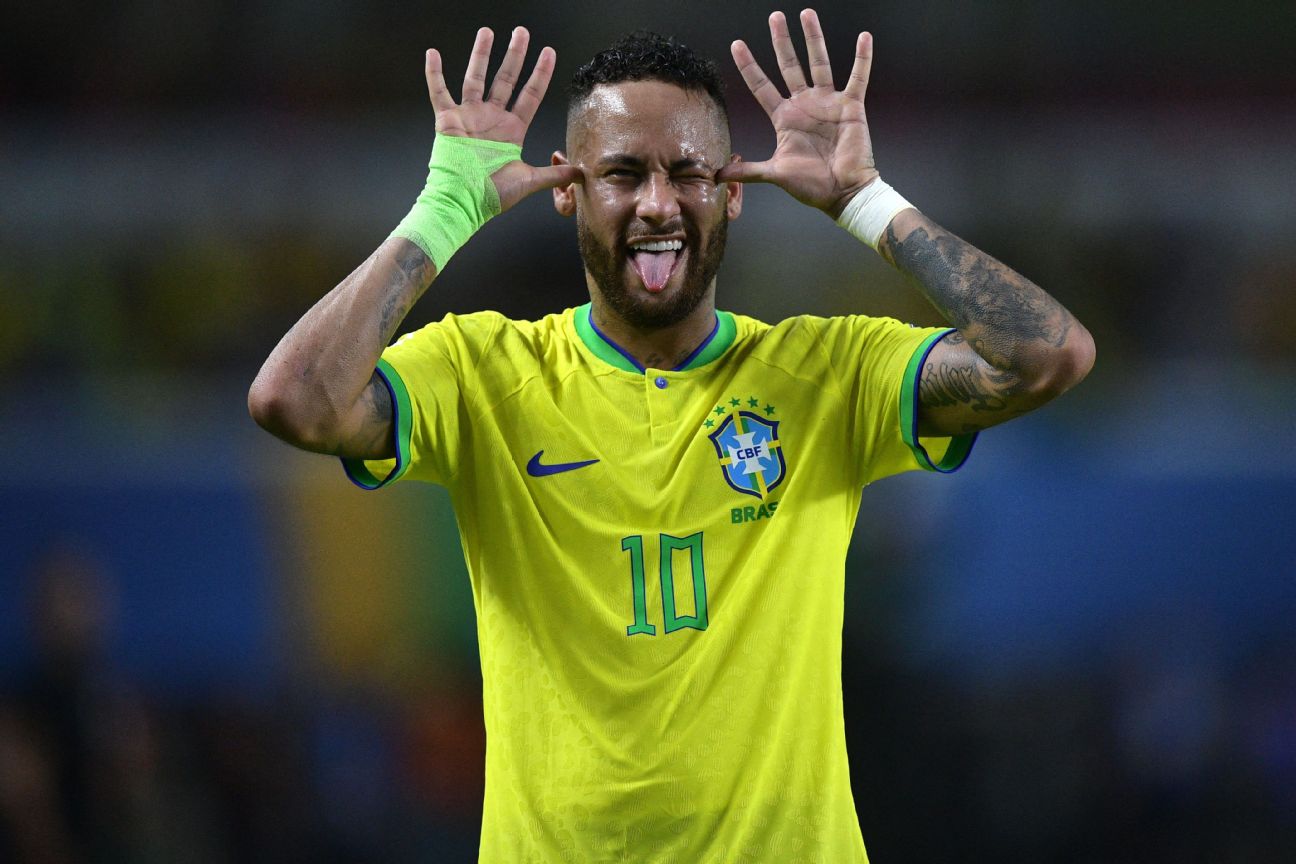Record-breaking Neymar shows he still has plenty to offer Brazil in World Cup qualifying

If Thursday’s opening night of South America’s World Cup qualifiers posed the question of how long Argentina can count on Lionel Messi, the round came to a conclusion Friday with Neymar making a firm declaration that he remains an elite player entitled to dream of a final dash for glory in 2026.
– Stream on ESPN+: LaLiga, Bundesliga & more (U.S.)
– Visit ESPN’s South American WCQ homepage
Neymar had an early penalty saved, and picked up a yellow card, but was at the heart of almost everything that Brazil produced in an attractive 5-1 win at home to Bolívia. He was both bow and arrow, making the play from his position behind the front three, and posing a threat to the goal. Twice he swept home balls played in from the right, and his two goals take him above Pelé as Brazil’s all-time top scorer — which will seem like sacrilege to some, but surely underlines the point that he is a remarkable talent.
Some might have seen this as the time that the team’s attack would no longer be built around Neymar, who has moved to the Saudi Pro League to play for Al Hilal. The rise of Vinícius Júnior had appeared to confirm such a view. But with the Real Madrid star absent though injury, Neymar used the occasion to stress that rumours of his demise had been greatly exaggerated.
True, there are stiffer challenges than Bolivia at home — on paper the easiest of all the 18 rounds in this qualification campaign. Bolivia were the first team to beat Brazil in World Cup qualification, and have beaten them more times than any other opponent. But always at home, at the extreme altitude of La Paz. Away, especially in the tropical heat of Belem — where it was so hot that drinks breaks were needed in both halves — they never had a chance.
Under coach Gustavo Costas, Bolivia had put together some encouraging results in warmup friendlies. But the coach complained about his side’s problems retaining the ball, with the consequence that they were never able to rest. This was to prove a fatal flaw against a hungry Brazil side playing their first match under new coach Fernando Diniz.
Supposedly keeping the seat warm until Carlo Ancelotti turns up in the middle of next year, Diniz could enjoy himself against Bolivia with better resources at his disposal than he has ever had in his coaching career. He consistently looks to create overloads, bringing much of the team over to one half of the field, and then switching play to the other flank. And with Neymar to do the switching, and players of the calibre of Rodrygo and Raphinha, Bolivia were torn apart time and time again.
The wingers scored the first three, Raphinha shooting home either side of a Rodrygo double. And then, to his great joy, Neymar added the last two. The only negative mark for the Brazil attack went to centre-forward Richarlison, who looks short of form, confidence and luck. Goalkeeper Guillermo Viscarra produced a fine save to block one of his headers, and thereafter his attempts to get on the scoresheet were increasingly desperate. The Tottenham man cut a sad figure on the bench after he was withdrawn.
And there is some cause for concern about the way that Brazil reacted to an attacking change by Bolivia. For much of the game the only worry for keeper Éderson had been an overhit Marquinhos back pass that he miscontrolled for a corner. But for the last 20 minutes, Bolivia withdrew target man centre-forward Marcelo Moreno and threw on the more mobile Victor Abrego. The pace of the newcomer caused problems. Abrego was able to get into space behind Arsenal defender Gabriel, making his Brazil debut, and scored with a wonderfully struck shot high at the near post. The teams of Diniz are sometimes accused of leaving themselves defensively open, and it will be interesting to see whether stronger opponents can take advantage.
On goal difference, then, Brazil top the table at the end of the first round, and in second place are Uruguay, who beat Chile 3-1 in Montevideo.
This was a meeting of new Uruguay coach Marcelo Bielsa with his onetime pater and assistant, Eduardo Berizzo. In an attempt to prevent Uruguay from building momentum through their attacking full backs, Berizzo played his strikers wide. But once Manuel Ugarte won the midfield for the Uruguayans, they were able to play their way through successfully. Darwin Núñez led the attacking line well, either bursting beyond the last defender or using his back-to-goal skills to bring others into the game, and Uruguay’s attacking midfielders ran riot. Nico de La Cruz scored twice and Federico Valverde once as they built up a three-goal lead, with Arturo Vidal giving Chile some consolation.
There is little time for excesses of joy or despair now that round one has been completed — Round 2 is coming up Tuesday.
